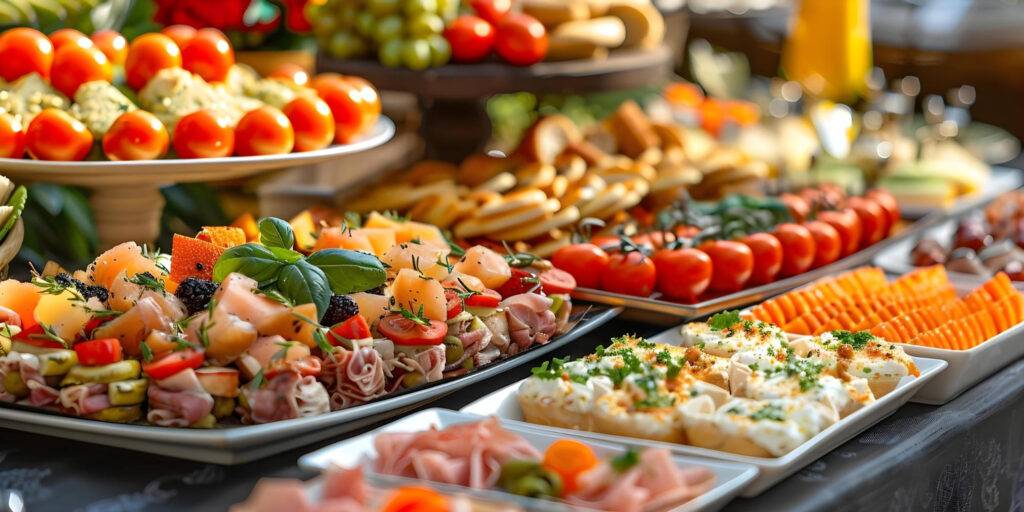Catering for large events comes with its own set of challenges, especially when it comes to addressing the diverse dietary requirements of your guests. Whether you’re organising a wedding, corporate event, or a large family gathering, ensuring that everyone has something delicious and safe to eat is crucial. It’s not just about providing an array of foods but also about making sure those with specific dietary needs feel included and respected.
In today’s world, dietary restrictions are more common than ever. From food allergies and intolerances to vegetarian and vegan preferences, the spectrum of dietary needs is wide. Planning an inclusive menu requires a thoughtful approach and meticulous planning. Identifying common dietary requirements and understanding the best way to accommodate them will help in creating a dining experience that is enjoyable for all guests.
Effective communication is equally important. Keeping open lines of dialogue with your guests about their dietary needs can prevent any mishaps and ensure a successful event. Moreover, it’s essential to maintain safe food preparation and service practices to avoid cross-contamination and other risks. By paying close attention to these aspects, you can create a seamless and inclusive dining experience at your event.
Identifying Common Dietary Requirements for Large Events
When planning catering for large events, we often encounter a variety of dietary requirements. Some of the most common include food allergies, intolerances, and specific dietary preferences. Understanding these needs is the first step towards creating a menu that everyone can enjoy safely. Common food allergies include nuts, gluten, dairy, shellfish, and eggs. Each of these requires careful planning to avoid cross-contamination and ensure safe preparation.
In addition to allergies, many guests may have specific dietary lifestyles. Vegetarian and vegan diets are quite common, and accommodating these preferences usually involves using plant-based ingredients and avoiding all animal products for vegans. There are also dietary preferences like paleo, keto, and gluten-free diets, which focus on specific types of food groups and nutrients. Knowing these requirements in advance helps us to tailor our offerings accordingly.
For such a varied audience, it’s essential to provide options that everyone can enjoy without feeling excluded. This approach not only shows respect for individual needs but also enhances the overall dining experience, making sure all guests feel equally valued and considered.
Planning an Inclusive Menu: Tips and Strategies
Creating an inclusive menu requires a strategic approach that takes into consideration the various dietary requirements identified. We like to start by offering a variety of dishes that cater to different needs. For starters, consider offering a mix of salads, soups, and appetisers that are labelled clearly with their dietary suitability. This makes it easy for guests to identify what they can eat without worry.
For main courses, consider having multiple options that cover a range of dietary restrictions. For example, offering a meat dish, a vegetarian option, and a gluten-free choice ensures that there’s something for everyone. It’s important to label these dishes accurately and avoid any potential cross-contamination during preparation. Using separate utensils and cooking stations can help in keeping foods safe for those with severe allergies.
Desserts should not be overlooked. Many people with dietary restrictions have limited choices when it comes to sweets. Ensuring a variety of options like dairy-free sorbets, gluten-free cakes, and vegan treats can provide a satisfying end to the meal for everyone. By thoughtfully planning and labelling each dish, you create a dining experience that is inclusive and enjoyable for all guests.
Effective Communication with Guests About Dietary Needs
Communicating with guests about their dietary needs is crucial for ensuring a safe and enjoyable dining experience. We start by gathering information well in advance of the event. This can be done through RSVP cards, online forms, or direct communication with guests. Asking specific questions about allergies, intolerances, and dietary preferences helps us build a comprehensive list of needs to address.
Once we have the information, we keep the lines of communication open. It’s essential to confirm any special requirements and ensure guests feel heard and understood. Clear labelling of all menu items during the event is also important. Using signs that indicate allergens and dietary suitability can make a significant difference. Additionally, having staff available to answer questions about the ingredients or preparation methods can provide extra peace of mind for guests with severe dietary restrictions.
Practical Solutions for Safe Food Preparation and Service
Ensuring safe food preparation and service is a top priority when catering to dietary needs. Cross-contamination is a major concern, so we take several precautions to avoid it. Using separate preparation areas and utensils for allergen-free dishes helps prevent accidental mixing. Colour-coded cutting boards and knives are a simple yet effective way to keep different food types distinct.
We also make sure to educate the kitchen and serving staff about the importance of dietary restrictions. Regular training sessions can provide them with the knowledge needed to handle food safely and answer guests’ questions confidently. Clear labelling of ingredients and vigilance in maintaining hygiene standards are critical. Additionally, we often prepare allergen-free dishes first to minimise the risk of contamination during busy preparation times.
Conclusion
Addressing dietary requirements at large events involves careful planning, clear communication, and meticulous food preparation. By identifying common dietary needs, planning an inclusive menu, communicating effectively with guests, and implementing practical solutions in the kitchen, we can create a dining experience that is safe, enjoyable, and inclusive for everyone. Attention to these details shows our commitment to providing top-quality service and ensuring that all guests feel valued.
If you’re ready to plan an event that caters to all your guests’ dietary needs, contact Blame Frank. Let us help you create an unforgettable dining experience with catering services that everyone can enjoy. Get in touch with us today to start planning your inclusive menu.


